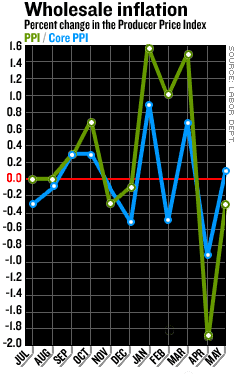NEW YORK (CNN/Money) -
U.S. wholesale prices fell again in May following April's record drop, the government said Friday, news that was unlikely to soothe worries about deflation -- though the report contained some hopeful signs.
The Labor Department said its producer price index (PPI), a measure of wholesale prices, fell 0.3 percent following April's 1.9 percent decline, which was the biggest on record.
But the so-called core PPI, which excludes often volatile food and energy prices, rose 0.1 percent after falling 0.9 percent in April. Economists, on average, expected PPI to fall 0.2 percent and core PPI to rise 0.1 percent, according to a Reuters poll.

May's PPI decline was driven mainly by a 2.6-percent drop in energy prices, the result of a plunge in oil prices following the end of the Iraq war. Energy prices fell 8.6 percent in April.
Oil prices have risen again in the weeks since the war, however, which could put some upward pressure on PPI and corporate profits this summer.
"The sharper-than-expected PPI decline will undoubtedly raise the stress level of [Federal Reserve officials] at the next policy meeting since it tells us price trends are moving dangerously in the wrong direction," said Anthony Chan, chief economist at Banc One Investment Advisors. "The only consolation, however, is that this report was dominated by energy price declines. Outside of the food and energy price components, price trends appear to be stabilizing."
The report had little impact on the U.S. stock market, which opened only slightly higher. Treasury bond prices were mixed, with long-term rates falling.
Bond traders were likely betting the Fed will cut its target for short-term interest rates at its next policy meeting, scheduled for June 24 and 25.
| Related stories
|

|
|
|
|
Though Fed officials and many other economists have been predicting for months that the economy would rebound in the second half of the year, Fed Chairman Alan Greenspan and others also have talked quite a lot about the perils of deflation, an unstoppable decline in prices that saps corporate profits and hurts economic growth.
Though Greenspan and other economists say the risk of deflation is remote, they also say its horrors -- as seen in Japan in the past decade, for example -- are so great that another rate cut is a harmless insurance policy.
Other economists, however, note that the rate cut does have some risks, and some worry it won't do much to stop deflation anyway.
Some components of the PPI were clearly not in deflation. Natural gas prices soared 71.6 percent, continuing a trend cited by Greenspan as potentially threatening to the economy's health, since natural gas is used by many electrical utilities and businesses for production. Residential gas prices rose more than 31 percent.
Most crude materials, in fact, saw price gains, as did many "intermediate" goods such as plumbing fixtures and ball bearings.
Other intermediate goods, however, saw price declines, and prices for many "finished" goods such as clothing and automobiles fell.

|

